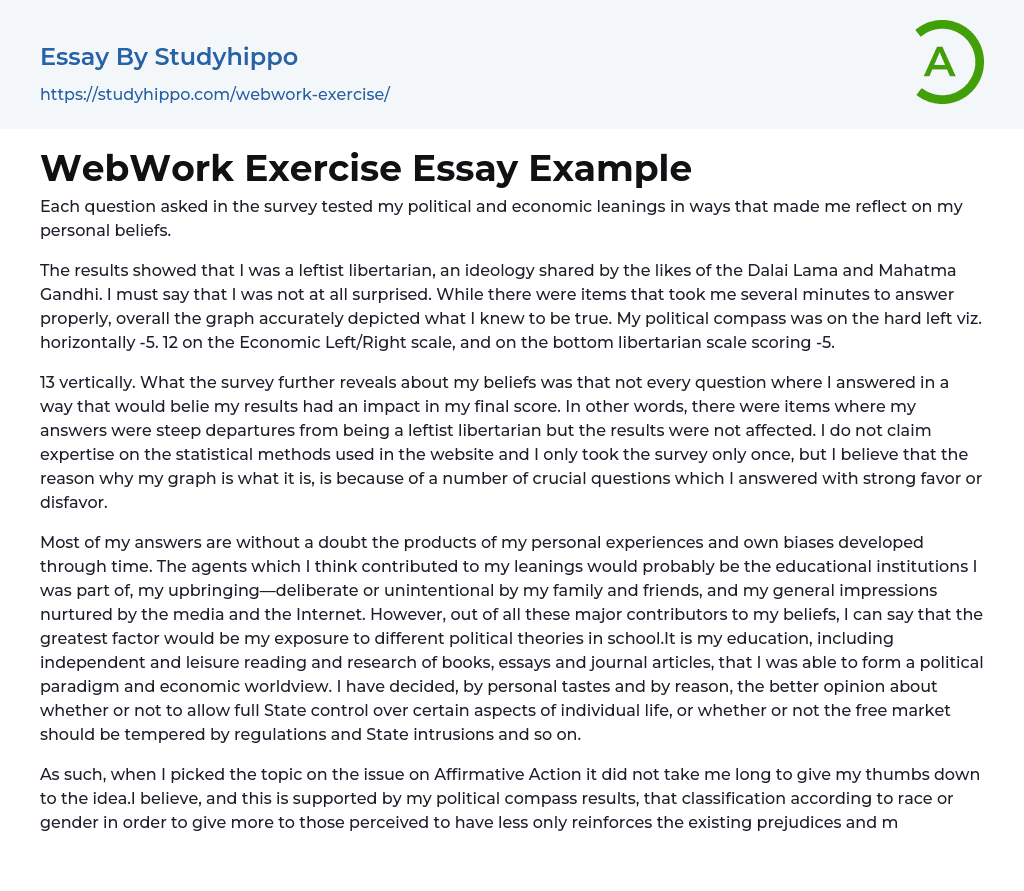Reflecting on my personal beliefs was provoked by each question in the survey testing my political and economic tendencies.
According to the results, I share the leftist libertarian ideology with individuals such as the Dalai Lama and Mahatma Gandhi. I was not surprised by this revelation as the graph accurately reflected my beliefs, despite some questions taking more time to answer. The graph indicated that my political stance is on the hard left, marked by a score of -5.12 on the Economic Left/Right scale and -5 on the bottom libertarian scale.
The survey found that my beliefs often leaned towards a leftist libertarian perspective. However, not all questions that went against this trend influenced my final score. Despite lacking expertise in the statistical methodology used by the website, I took the survey once and attribute my resulting graph to several critical questions
...that I answered with significant favor or disfavor.
My answers are shaped by my personal experiences and biases formulated over time. The institutions I attended, my upbringing, and media consumption have influenced my outlook. However, the primary factor in shaping my beliefs has been exposure to diverse political ideologies through my education and independent reading. Through this exposure, I have developed a political and economic worldview based on personal preferences and rational reasoning. I have formed opinions on the degree to which the government should control aspects of individual life and how much regulation is necessary in a free market.
Choosing the topic of Affirmative Action, I quickly denounced the practice due to my belief that categorizing individuals by race or gender to provide extra support only reinforces stereotypes and biases. My political compass results
align with this belief. While Affirmative Action may have been necessary before, modern changes have made this policy out of place and possibly harmful to the minority. As a leftist and libertarian, I firmly believe in treating each individual equally.
If there are classifications for individuals based on their abilities and skills, it should be done using valid qualifications like academic performance and aptitude. State intrusion in education should be minimal to prevent a fascist-totalitarian regime which can suppress an individual's creative and cultural growth along with society's. Completing the survey was a beneficial and validating learning experience because it delineated my biases through statistical analysis. Before starting the test, I had a vague notion about my political orientation, but the results confirmed my beliefs. They also gave me an enhanced understanding of my thinking patterns and associations with famous people. Overall, I am content with the results as they are similar to my political views.
Ultimately, I identified my political stance and confirmed it by examining Affirmative Action.
ReferencesCahn, S. (1995). History of affirmative action.
The source for the AAD Project's Catalogue of Online Periodicals is available at http://aad.english.ucsb.edu/docs/Cahn.html, as indicated by Connerly, W.
(2009) Ward Connerly's article "Study, Study, Study - A Bad Career Move" on the Minding the Campus website at http://www.mindingthecampus.com/originals/2009/06/by_ward_connerly_about_five Bell, D. highlights the significance of revamping universities and avoiding solely focusing on academics as it can lead to career blunders.
The book "And We are not Saved: The Elusive Quest for Racial Justice" was published in 1987 by Basic Books in New York, and its author's name is W. Brittenden.The website PoliticalCompass.org offers a survey questionnaire called "The Political Compass". (D.)
K. Vance wrote this
information on November 14th, 2008 and it can be found on http://www.politicalcompass.org/test.
Advocating for a nation that does not differentiate based on color. Retrieved from http://www.weeklystandard.
Visit the following website to read about Ward Connerly's thoughts on success:
com/weblogs/TWSFP/2008/11/ward_connerly_on_the_success_a. asp
- Social Construction of Gender essays
- Affirmative Action essays
- Assisted Suicide essays
- Capital Punishment essays
- Censorship essays
- Child Labour essays
- Child Protection essays
- Civil Rights essays
- Corporal Punishment essays
- Death Penalty essays
- Empowerment essays
- Euthanasia essays
- Gay Marriage essays
- Gun Control essays
- Human Trafficking essays
- Police Brutality essays
- Privacy essays
- Sex Trafficking essays
- Speech essays
- Bias essays
- Big Five Personality Traits essays
- Body Image essays
- Mind essays
- Motivation essays
- Phobias essays
- Thought essays
- Boy essays
- Gay essays
- Gender essays
- Gender Identity essays
- Gender Roles In Society essays
- Gender Stereotypes essays
- Girl essays
- Homosexuality essays
- Human Sexual Behavior essays
- Lgbt essays
- Man essays
- Masculinity essays
- Sexual Orientation essays
- Transgender essays
- Woman essays
- Addiction essays
- Anatomy and Physiology essays
- Biodegradation essays
- Cancer essays
- Dental Care essays
- Disability essays
- Disease essays
- Disorders essays
- Health Care essays




